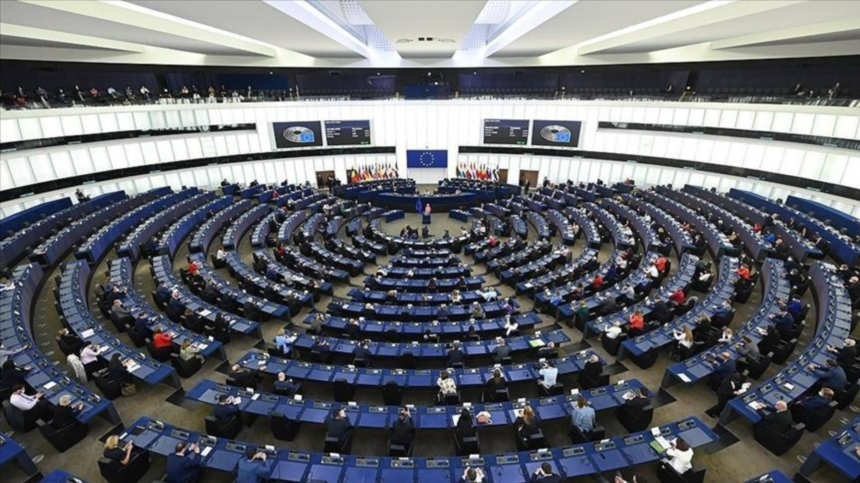Most members of the European Parliament who participated in discussions regarding draft-reports for Kosovo and Serbia called on the European Union to clarify Kosovo’s integration process, so the country does not remain a grey area on Europe’s map.
On Thursday, in the Foreign Policy Committee of the European Parliament, the rapporteur for Kosovo, Riho Terras, presented his annual draft-report on Kosovo’s situation and progress towards the EU.
During the debate, there was an expectation that Kosovo would quickly establish its Assembly after the parliamentary elections on February 9 and form its Government.
The EU’s imposition of punitive measures on Kosovo was criticized, with calls for the EU to maintain its focus on the region, especially Kosovo, amid the challenging circumstances in Europe and worldwide.
Terras stated that he expects the EU to take a more active role in the Western Balkans and that the new European Commission and its High Representative, Kaja Kallas, should lead this effort.
He also called for the EU to lift sanctions against Kosovo, which were imposed in 2023 due to the tense situation in the country’s north, home to a Serbian majority. He argued that these measures were not fair.
Terras urged the five EU countries that have not yet recognized Kosovo to do so, in order to accelerate the process of Kosovo’s integration into the EU.
Kosovo is the only country in the Western Balkans that is not yet a candidate for EU membership.
Elio Di Rupo, the shadow rapporteur from the Socialist and Democrat Group, who also monitored the elections in Kosovo, said that the process was of high quality with high standards.
He noted that the media in Kosovo are facing challenges and called for more progress in the fight against corruption.
Di Rupo also mentioned that the relationship between Kosovo’s Prime Minister Albin Kurti and Serbia’s President Aleksandar Vučić was difficult due to historical reasons. He added that although Kurti was imprisoned by the Serbian regime, this must be overcome for the dialogue aimed at normalizing relations to move forward.
Nathalie Loiseau, speaking on behalf of the Liberal Group, supported the text of the draft-report. Loiseau was head of the EU election observers in the February 9 elections in Kosovo.
She called for the revival of the Kosovo-Serbia dialogue and for both parties to fulfill their obligations.
Loiseau also emphasized the need for all EU countries to recognize Kosovo and requested that the EU clarify Kosovo’s European path to avoid the country remaining in a grey zone.
Davor Ivo Stier, head of the Parliamentary Delegation for Kosovo, also called for the lifting of sanctions against Kosovo, saying that “this imbalanced EU approach towards Kosovo and Serbia,” especially after the September 2023 attack in Banjska, hinders progress in the dialogue.
A representative from the European Commission, Jiri Plecity, Head of the Unit for Kosovo and Serbia in the Directorate-General for Enlargement, welcomed the development of the elections in Kosovo but expressed regret over the delays in counting the votes.
He stated that he expects the new government to be formed as soon as possible to continue reforms and normalize relations with Serbia.
The European Commission, on the other hand, agrees with the main points of the report.
The Commission welcomed Kosovo’s efforts to overcome obstacles in the Central European Free Trade Agreement (CEFTA).
Zuzana Michalciva Sutiakova, as a representative of the EU’s External Action Service (EEAS), mentioned the harsh rhetoric during Kosovo’s electoral campaign and the problems with vote counting, but stressed that these should not overshadow the key positive points that demonstrated Kosovo remains a functional democracy.
She said these elections should mark the first step towards the return of Serbs to Kosovo’s institutions.
“We expect the Assembly and Government to be formed. After the elections, we hope to mark a new moment in Kosovo’s EU path. As stated by Commissioner [for Enlargement] Marta Kos and High Representative Kallas, we are ready to consider Kosovo’s EU membership application once we receive a mandate from the Council. Progress in relations with Serbia is an unconditional requirement. Dialogue has no alternative,” said Michalciva Sutiakova.
Neither the EEAS representative nor the European Commission official mentioned lifting the sanctions against Kosovo, despite this being one of the most frequent demands from European Parliament members.
The draft-report for Kosovo values the country’s commitment to EU integration. The document states that Kosovo’s future is in the EU, and efforts to bring the country out of the grey zone are in both Kosovo’s and the EU’s interest.
It highlights “significant progress in the areas of justice, security, and freedoms, in the fight against organized crime, and in the functioning of the market economy” but expresses regret over the “limited progress” in the rule of law.
The draft-report again calls for the EU to lift punitive measures against Kosovo, which include the freezing of some funds and the suspension of high-level meetings.
“We call for the immediate lifting of EU sanctions against Kosovo, which are no longer justified and are in contradiction with Kosovo’s demonstrated commitment to European values and alignment with EU policies,” the document states.
The European Parliament also supports Kosovo’s request for membership in the Council of Europe and its plan to join NATO’s Partnership for Peace program.
The report expresses concern about the unsatisfactory situation in Kosovo regarding corruption and calls for visible results in investigations and convictions.
Serious concern is also raised over systematic weaknesses in Kosovo’s judiciary, especially regarding independence and respect for the separation of powers.
“We reiterate concern about delays in judicial cases and criticism from government officials regarding decisions in individual cases,” the draft-report states.
Concerns are also raised about the security situation in northern Kosovo, particularly after the armed attack in Banjska in September 2023 and the attack on the Ibër-Lepenc Canal in November 2024.
The report calls for the perpetrators of these violent acts to be brought to justice.
It expresses regret that Serbia has not brought to justice the perpetrators of the terrorist attack in Banjska, including former deputy leader of the Serbian List, Millan Radoičić.
Regarding the state of the media, the report mentions the existence of a pluralistic environment and emphasizes the role of the Independent Media Commission, whose autonomy “must be strongly protected.”
The report calls for more transparency regarding media ownership and financing and expresses serious concern over cases of attacks on journalists.
The document also expresses support for the dialogue process aimed at normalizing relations between Kosovo and Serbia and welcomes the appointment of Peter Sorensen as the EU’s special envoy for this dialogue.







